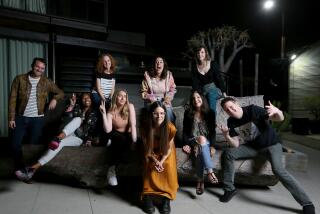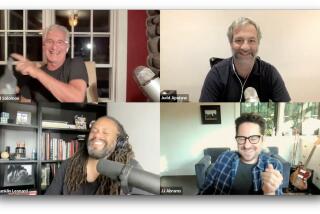Peter Guber, navigator of narrative
- Share via
WHAT IF you could send your life back to rewrite? Super producer Peter Guber thinks you can, and he’s making the case for it in an innovative course he’s developed through UCLA’s film school.
The course, called “Navigating a Narrative World,” is the product of long experience and not just a theory. Guber, former head of Sony Pictures and the producer of such megahits as “The Color Purple,” “Rain Man” and “Batman,” has spent a lifetime (and made a very good living) telling stories.
He understands the power of narrative and its ability to shape the stories we tell each other and, more important, the ones we tell ourselves. As Joan Didion wrote, “We tell ourselves stories in order to live.”
“I wanted students to recognize the power of narrative,” he said. “Storytelling is not frivolous entertainment. It’s an inspirational and professional tool that can bring life into focus.”
Clearly Guber is on to something. When the course began in April, it was scheduled for an ordinary-size classroom, but when 250 students -- from a range of formal disciplines -- signed up, it had to be moved to a lecture hall.
The lineup of guest lecturers reads like a talk show host’s dream. (After all, Guber -- who hosted the class along with UCLA Film School Dean Robert Rosen -- knows how to book talent.)
They called in HBO Films President Colin Callender, studio exec Toby Emmerich and Oscar producer and Geffen Playhouse Producing Director Gilbert Cates to discuss storytelling through television, film and theater. Apache storyteller Dovie Thomason talked about the historic roots of narrative.
Lawyer and political commentator Susan Estrich told the class that the most successful politicians have powerful life stories and know how to tell them. (Perhaps that explains why voters have warmed to both Sen. Barack Obama and Sen. John McCain.)
Wired magazine Editor Chris Anderson and Borders Chief Executive George Jones talked about business narrative, while Los Angeles Times Book Review Editor David L. Ulin discussed storytelling in long form. Spiritual writer and motivational speaker Deepak Chopra talked about how people can maintain wellness by visualizing health.
W magazine Editorial Director Patrick McCarthy, Variety Editor Peter Bart and The Times’ Pulitzer Prize-winning automotive columnist Dan Neil discussed how news narrative affects everyday life. TV producer Mark Burnett discussed how it affects his specialty, reality shows.
Border Grill and Ciudad chefs Susan Feniger and Mary Sue Milliken and LA Weekly Pulitzer Prize-winning food critic Jonathan Gold talked about the stories that we can learn from menus. Former Los Angeles Lakers coach Pat Riley explained that sports are conveyed through a rich range of narratives with many tellers: the players, the owners, the fans, the media and the public.
Guber said the idea was to get students thinking about how they approach their lives and what they intend to make of their academic careers, once they graduate.
“The gratifying part is that the kids got it,” he said. “They saw storytelling as a tool for personal development. It’s entertainment tipped on its heels and put to another use.”
On one recent evening, the class featured the double bill of movie music master Hans Zimmer and inspirational guru Tony Robbins, who was the cheerleader Bill Clinton called in to rouse the White House staff.
The students, all of them young and casually dressed, were an eclectic mix: Law school students mingled with theater majors. Budding scientist sat next to economists-to-be.
Zimmer impressed the class with his ability to break musical scores into their narrative components. He talked about how he will first discuss a film with the director and then form his own thoughts on the story, which he translates into notes. (He’s been nominated for seven Oscars for his scores, which include “Rain Man,” “The Lion King” and “Gladiator.”)
Robbins told students: Change your thinking, change your life. (Usually he conveys this message to stadium audiences instead of college lecture halls.) The students swarmed around him afterward, shaking his hand and snapping his picture with cellphone cameras.
Guber, who has taught at UCLA’s film school for 39 years, was beaming. Spreading the narrative gospel has become a personal cause.
He wrapped up the course and took a stack of the students’ final essays -- this is no easy A -- on the plane with him to Italy, where’s he vacationing.
A few weeks ago, he swore he would never do the class again. It was too much work coordinating all the speakers. But he’s since changed his mind. “It’s all been very inspirational for me,” he said in a phone interview this week.
Do classes have sequels? Apparently they do. Guber might have to rent a bigger hall, once the story behind the storytelling gets out.
--
More to Read
Sign up for our Book Club newsletter
Get the latest news, events and more from the Los Angeles Times Book Club, and help us get L.A. reading and talking.
You may occasionally receive promotional content from the Los Angeles Times.








